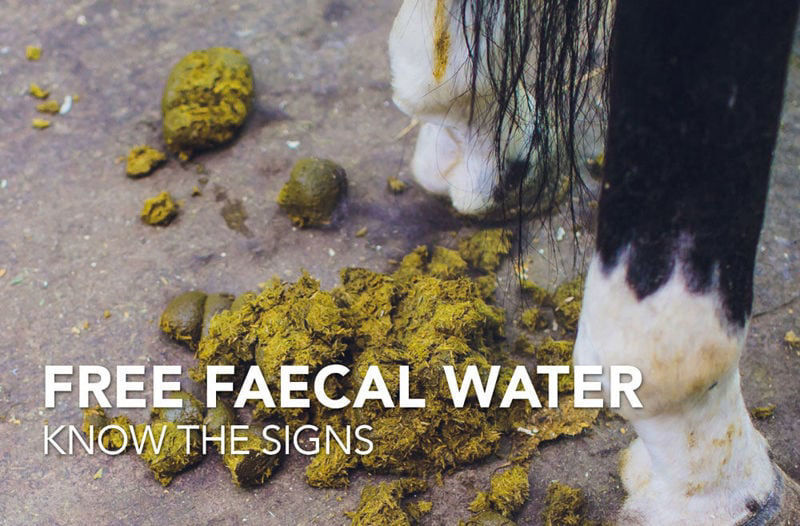Free Faecal Water (FFW) Syndrome in horses is a non-life-threatening issue, however it is unpleasant for the horse and owner. What do we know about it and what can you do to help support your horse when symptoms occur?
What is Free Faecal Water Syndrome?
Unlike diarrhoea, which is characterised by loose droppings lacking in solid matter, horses exhibiting symptoms of FFW will have formed droppings which are accompanied by free-flowing water either before, during or after defecation. This watery poo can pose a problem as not only does it make a mess of the horse’s hind legs, but some horses can also suffer from skin irritations (dermatitis) where the watery faeces has come in to contact with their legs.

Image: Look out for water when your horse passes faeces
It is important to ascertain whether your horse is suffering from diarrhoea or Free Faecal Water as in some cases, diarrhoea can become life threatening, and the correct mode of treatment is imperative. FFW syndrome is usually harmless but still requires careful management to rectify any digestive disturbances. Horses suffering from FFW don’t appear to exhibit any other symptoms such as loss of appetite or decrease in bodyweight.
The exact cause of Free Faecal Water syndrome is yet to be determined; however, risk factors are thought to include poor dentition, digestive issues such as parasites, inflammation in the gut, dietary changes, or stress. Whilst the cause cannot be agreed upon by researcher’s, common links such as position in the herd pecking order, being a gelding, physical stress and gut dysbiosis / inflammation have been identified.
The horse’s hindgut is a huge fermentation chamber and is where the horse obtains their energy from fibre, but it is also a water reservoir for the horse. Fibre not only plays an important role in energy pathways for the horse, but also has a great water holding capacity. Often when Free Faecal Water symptoms are seen, it is due to a poor water holding capacity of the fibre in the hindgut, possibly due to the type of fibre being ingested. The most recent research into FFW syndrome was undertaken with a population of horses in Norway and Sweden. Researchers aimed to determine whether there was a link between feeding wrapped forages i.e., haylage and FFW Syndrome in horses. This link was not verified however there were positive associations between feeding hay and an improvement in FFW symptoms in the study horses. Although, some horse’s symptoms also improved when the type of haylage being fed was changed.

Image: The horse's Caecum and colon
How to manage a horse with FFW
Reviewing your horse’s diet and management is a likely way of combatting the symptoms of FFW. Areas to focus on are:
- Feed a digestive support supplement, such as Feedmark Ultimate Ease®.
- Regular dental checks
- Feed a high forage diet or change forage source (gradually)
- Manage your horse’s routine to minimise stress
- Appropriate parasite control
What digestive supplement should I feed my horse?
Feeding a horse digestive supplement that helps to buffer hindgut pH levels as well as support the microbial population will offer a high level of digestive support to your horse.
Ultimate Ease® is a scientifically formulated composition providing comprehensive support for the entire gastrointestinal tract.
Image: Feedmark Ultimate Ease®
Utilising the latest developments in fermentation science, Ultimate Ease® supplies pre-, pro- and postbiotics combined with mineral salts, Beta glucans, high-quality fibres and a unique combination of Kaolin, Lecithin, Pectin and Glutamine to optimise digestion and assist the delicate mucosal gut lining.
Calcium carbonate, Dicalcium phosphate, Magnesium hydroxide and Magnesium carbonate work synergistically with the body to support a healthy gastric pH and soothe the mucosal lining of the stomach and small intestine.
Lecithin and Pectin support the natural protective mucosa of the stomach which is known to become irritated by high concentrate diets, medications, and stress.

Image: Biotics Info
Support for the sensitive microbial population in the hindgut is provided by the unique combination of pre-, pro- and postbiotics in Ultimate Ease®. The prebiotics Fructooligosaccharide (FOS) and Mannan oligosaccharide (MOS) provide food sources for beneficial bacteria that are responsible for fermenting fibrous foodstuffs the horse eats. The probiotic YeaSacc® provides a supply of live yeast (Saccharomyces cerevisiae) which is an important component of the microbial population, and which stimulates the cellulolytic activity of bacteria within the hindgut, optimising fibre fermentation.
Postbiotics are the next generation of fermentation products. The postbiotic used in Ultimate Ease® includes cell components and metabolites which have been shown to positively benefit the bacteria within the horse’s gut. Research has shown increased volatile fatty acid production by horses fed the postbiotic, demonstrating a positive outcome on fibre fermentation, especially of high-fibre forages.
Q & A:
What is Free Faecal Water?
Free Faecal Water (FFW) describes a condition where horses pass normal droppings
with watery faeces that appears before, during or after defecation.
Is Free Faecal Water the same as Diarrhoea?
No, FFW is not associated with infectious causes of diarrhoea.
What causes Free Faecal Water?
The exact cause isn’t known; however, it could be related to poor dentition, digestive issues such as parasites,
inflammation in the gut, abrupt dietary changes, or stress.
What are the symptoms of Free Faecal Water?
Formed droppings which are accompanied by free-flowing watery poo either before, during or after defecation.
How can I help my horse who is suffering from Free Faecal Water?
Feed a horse digestive supplement such as Ultimate Ease® which will support the entire digestive system.













